Chinese prisoners say forced labor has been used to manufacture Milwaukee Tool gloves
People held at Chishan Prison in south-central China report being forced to produce work gloves for the Brookfield-based tool company, which did not answer specific questions about its supply chain.
Wisconsin Watch
May 10, 2023
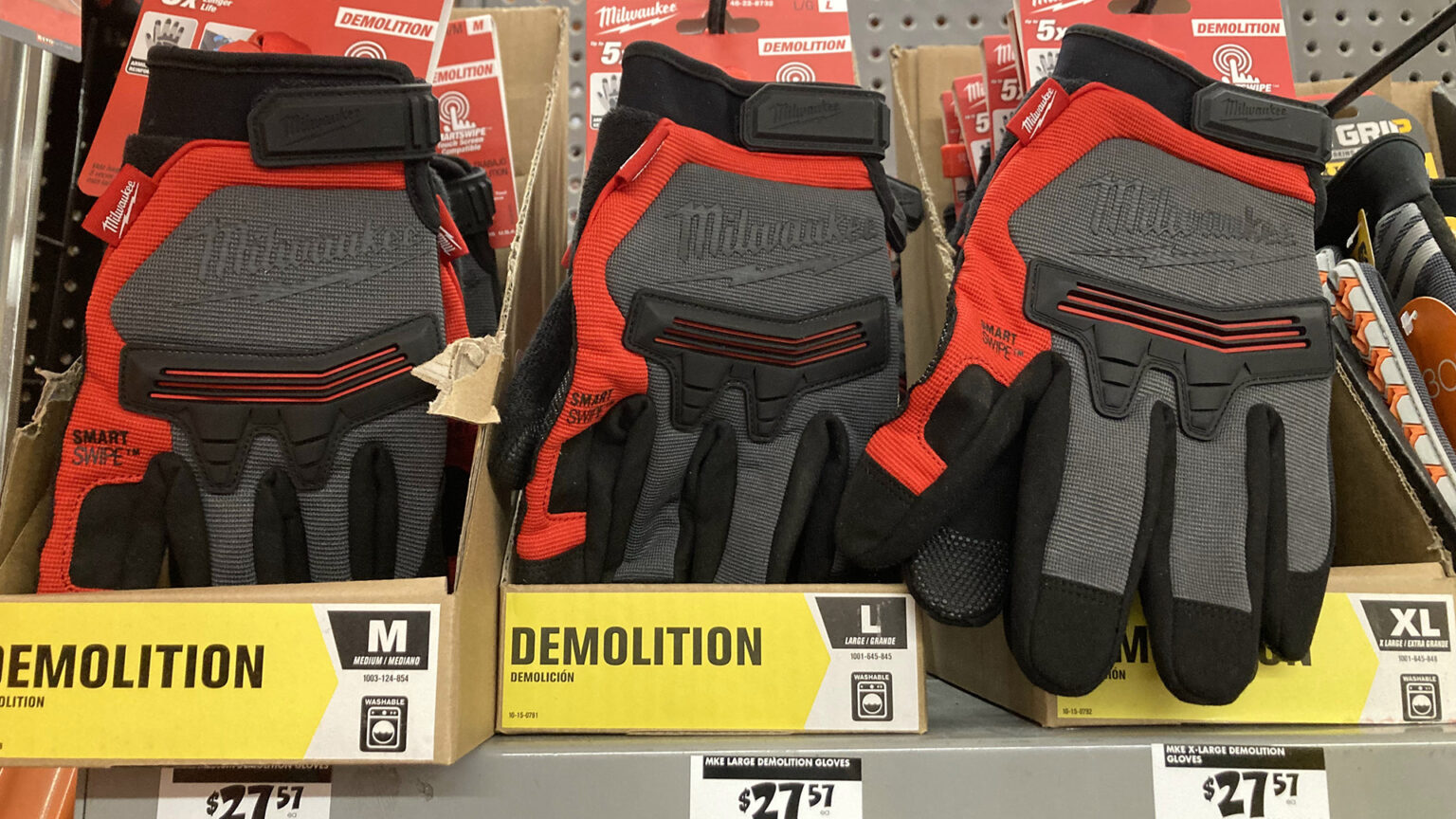
Milwaukee Tool "Demolition" gloves are seen at a Home Depot in Madison on Feb. 5, 2023. Two men say they were forced to make "Demolition" gloves and other Milwaukee Tool glove models under grueling conditions while incarcerated at Chishan Prison in China's central Hunan Province. (Credit: Zhen Wang / Wisconsin Watch)

This article was first published by Wisconsin Watch.
Day after day over nearly five years in Chishan Prison, Lee Ming-che walked the five minutes from his cell to one of several manufacturing spaces on prison grounds.
The prison in China’s central Hunan Province houses political prisoners like Lee, a renowned human rights activist who met with then-House Speaker Nancy Pelosi during her consequential 2022 visit to Taiwan. Lee, a Taiwanese college administrator, was convicted in China of “subverting state power” in 2017 and released in 2022.
In an interview in Mandarin with Wisconsin Watch from his home in Taiwan, Lee said officials forced him and hundreds of other Chishan prisoners to work roughly 13 hours a day, seven days a week with just a few days off around the Chinese New Year. His pay? The equivalent of about 48 cents a day.
“I was like a robot, doing work in the daytime and then returning to the cell (at night),” Lee recalled.
His tasks included cutting polyester fabric and sewing it together to make work gloves, producing at least 200 pairs a day.
He said he knew the gloves were destined for the United States.
He later learned about the company whose brand was on the gloves, stamped with a thunderbolt and the word “Milwaukee.” Shown photos of Milwaukee Tool gloves for sale at two Home Depot stores in Madison, Lee verified four types of gloves he was forced to make — Free-Flex, Demolition, Performance and Winter Performance.
“I can recognize the models and the logo of work gloves,” Lee told Wisconsin Watch. “As long as I’ve made them before, I can recognize them.”
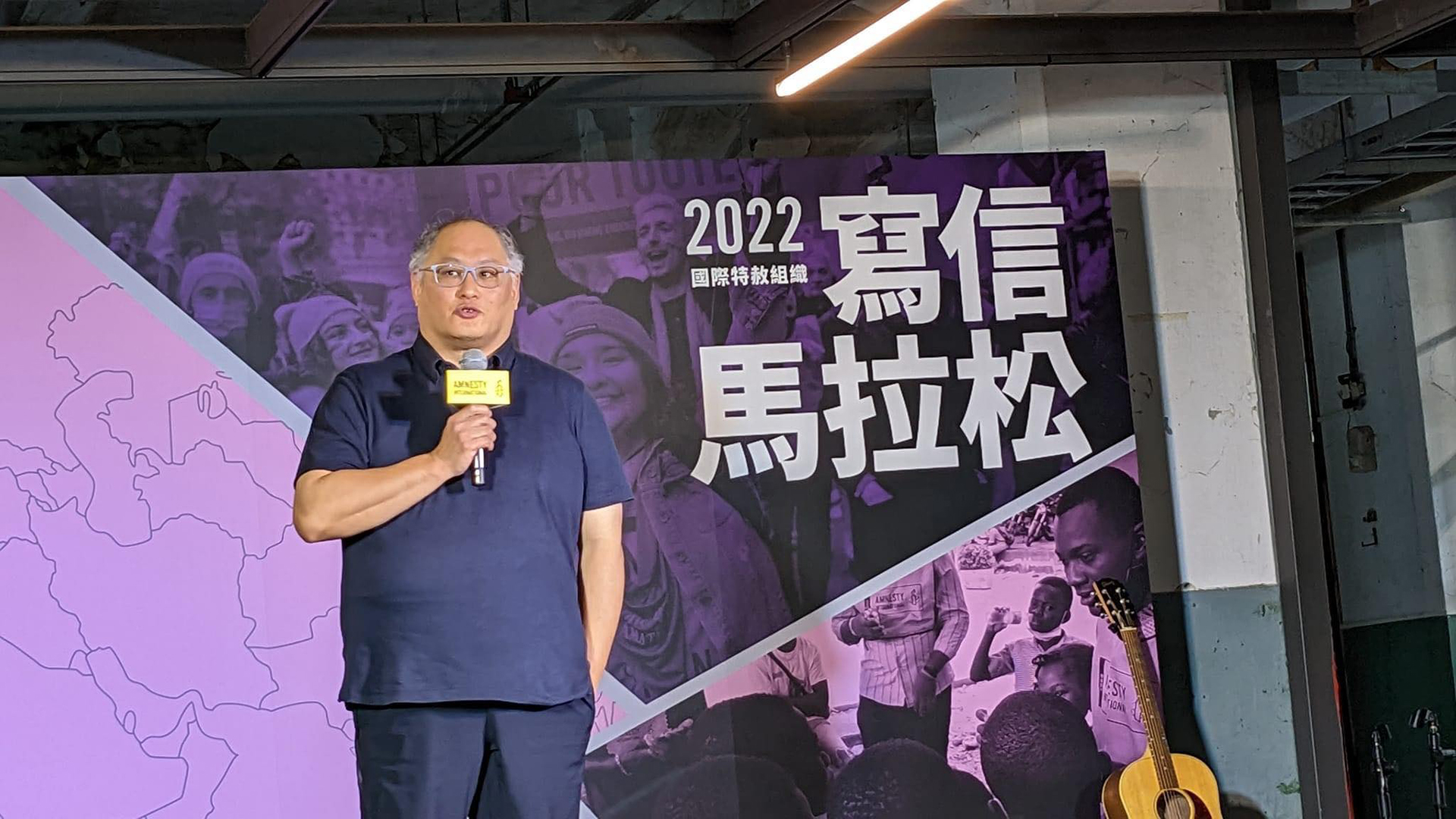
Lee Ming-che addresses an audience at an event held by Amnesty International Taiwan, in Taipei, on Dec. 3, 2022. Lee, a Taiwanese college administrator, was convicted in China of “subverting state power” in 2017 and released in 2022. He says he was forced to make Milwaukee Tool glove models under grueling conditions while incarcerated at Chishan Prison in China’s central Hunan Province. (Credit: Courtesy of Lee Ming-che)
A Wisconsin Watch investigation found additional evidence that Chishan prisoners were paid pennies to make work gloves bearing the iconic brand of Milwaukee Tool, a company with a nearly 100-year history in Wisconsin.
A supplier for Milwaukee Tool subcontracted work to the prison, two former prisoners said in separate interviews. A self-identified salesperson of the supplier, Shanghai Select Safety Products, said it manufactured the majority of Milwaukee Tool’s work gloves. And regulatory filings show Shanghai Select was contracted to manufacture “Performance Gloves” for a subsidiary of Milwaukee Tool’s parent company.
Milwaukee Tool: ‘No evidence to support’ forced labor accusation
Wisconsin Watch began its investigation after Chinese exile Shi Minglei, who now lives in Minnesota’s Twin Cities, launched a change.org petition in November to pressure Milwaukee Tool to stop sourcing gloves made at the prison. She alleges her husband, imprisoned human rights activist Cheng Yuan, also has been forced to use a sewing machine to produce goods at the prison.
Shi cannot verify he is making Milwaukee Tool products, but she heard from two former prisoners of Milwaukee Tool’s production at the prison.

Shi Minglei, the wife of an imprisoned Chinese human rights activist Cheng Yuan, fled to the United States in 2021 and now lives in Minnesota’s Twin Cities. She launched a change.org petition in November calling for Brookfield-based Milwaukee Tool to stop sourcing gloves made from forced prison labor in China. A Milwaukee Tool spokesperson says the company has “found no evidence to support” allegations about forced labor. Shi is shown in Minneapolis on Feb. 19, 2023. (Credit: Ariana Lindquist for Wisconsin Watch)
A Milwaukee Tool spokesperson said the Brookfield-based company has “found no evidence to support the claims being made” about its link to forced labor.
“Milwaukee Tool regularly conducts a complete and thorough review of our global operations and supply chain,” Kharli Tyler, vice president of brand marketing, said in an email that did not answer specific questions from Wisconsin Watch.
Thirteen shipments of work gloves from Shanghai arrived at United States ports since the summer of 2019 when Lee said he noticed Chishan prisoners making Milwaukee Tool-branded gloves, according to an analysis of customs shipping data provided to Wisconsin Watch by S&P Global Market Intelligence.
Listed as a consignee for the gloves: Milwaukee Electric Tool Co.
Those records end in 2020, but whether the shipments ended is unclear. Companies can ask federal Customs and Border Protection to shield their names and addresses from published shipping data, said S&P Global spokesperson Katherine Smith.
“If Milwaukee Tool was sourcing from a foreign prison, they’re in violation of Section 307,” said Charity Ryerson, a human rights lawyer and executive director of Chicago-based Corporate Accountability Lab, referring to the federal law banning imports of goods made with forced labor.
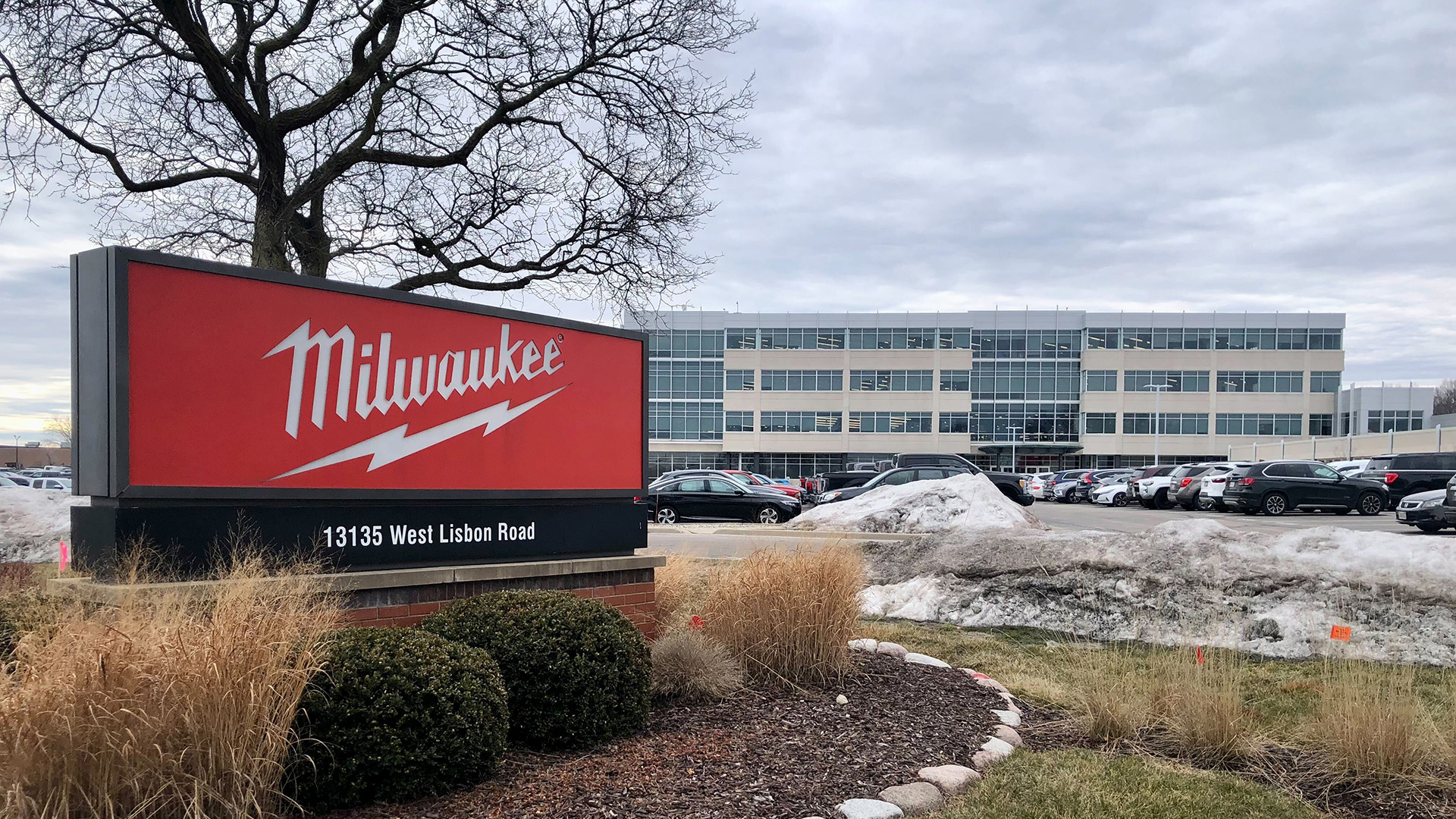
The Milwaukee Tool global headquarters are seen at 13135 West Lisbon Road in Brookfield on March 9, 2023. A spokesperson says the company “found no evidence to support” allegations that subcontractors have used forced prison labor in China to produce several types of Milwaukee Tool-branded gloves. (Credit: Jim Malewitz / Wisconsin Watch)
Milwaukee Tool’s parent company, Hong Kong-based Techtronic Industries Company Limited, has a policy prohibiting the use of “modern slavery and human trafficking.” The Milwaukee Tool Legal Council in December told the Business and Human Rights Centre that “a thorough investigation of these claims was conducted, and we have found no evidence to support the claims being made.” The company “does not tolerate the use of forced labor.”
In February, in a response shared with Wisconsin Watch, DLA Piper, a law firm with offices around the world that represents Milwaukee Tool and Techtronic Industries, said forced labor allegations were “investigated, and denied.”
Prisoners discuss forced labor
Shi, who is pushing the change.org petition, has had little contact with Cheng since his imprisonment in 2019. She said her husband wrote three letters to his family in 2022 in which he opaquely referenced forced labor.
In a letter to his sister last May, Cheng implicitly described excessive hours of forced labor by citing two lines from a poem by Tao Yuanming, one of China’s great poets. Translations go like this: “I rise early to clear away the weeds, Till, hoe on shoulder, I plod home with the moon.”
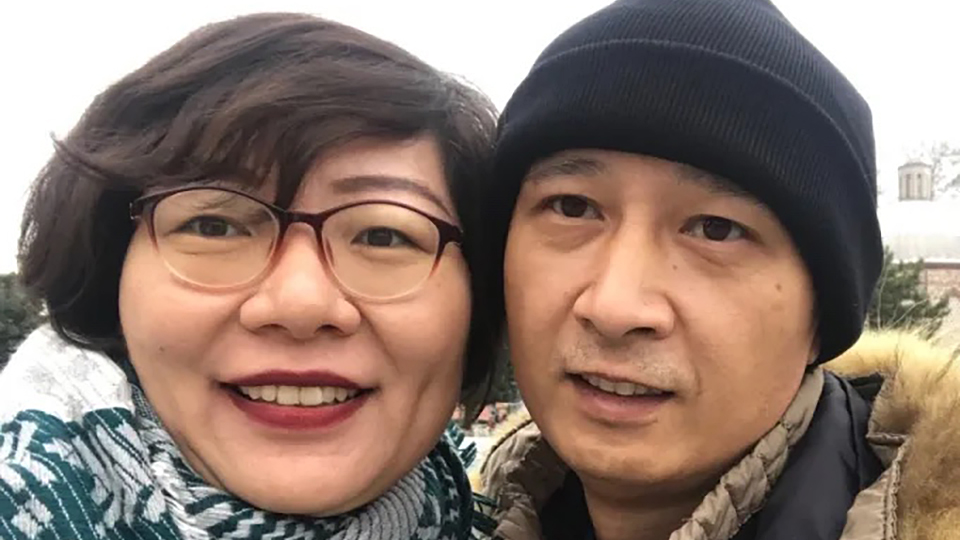
Chinese exile Shi Minglei, who now lives in Minnesota, is shown with her husband Cheng Yuan around Christmas of 2018. The photo was taken about six before authorities in China arrested Cheng on subversion charges while he was running a Chinese organization that advocated for victims of discrimination. Cheng is still in prison, and Shi says he has been forced to make products under grueling conditions. (Credit: Courtesy of Shi Minglei)
Shi said she aims to ease the slavery-like conditions endured by Cheng, who was arrested while running a Chinese organization that advocated for victims of discrimination.
Wisconsin Watch interviewed an additional former prisoner who claims Milwaukee Tool is profiting from forced labor at Chishan Prison.
He asked to use the pseudonym Xu Lun to protect his safety.
While incarcerated at Chishan Prison, Xu remembers making all types of work gloves Lee identified and another Milwaukee Tool-branded model: Winter Demolition.
“Everyone knows these things will be exported to America,” Xu said. “We stitched labels onto every single pair (of gloves). Labels do show the address.”
The label attached to one pair purchased by Wisconsin Watch reads: “ENGINEERED BY MILWAUKEE TOOL. PROFESSIONALLY MADE IN CHINA,” and it includes the company’s website URL and Brookfield address.
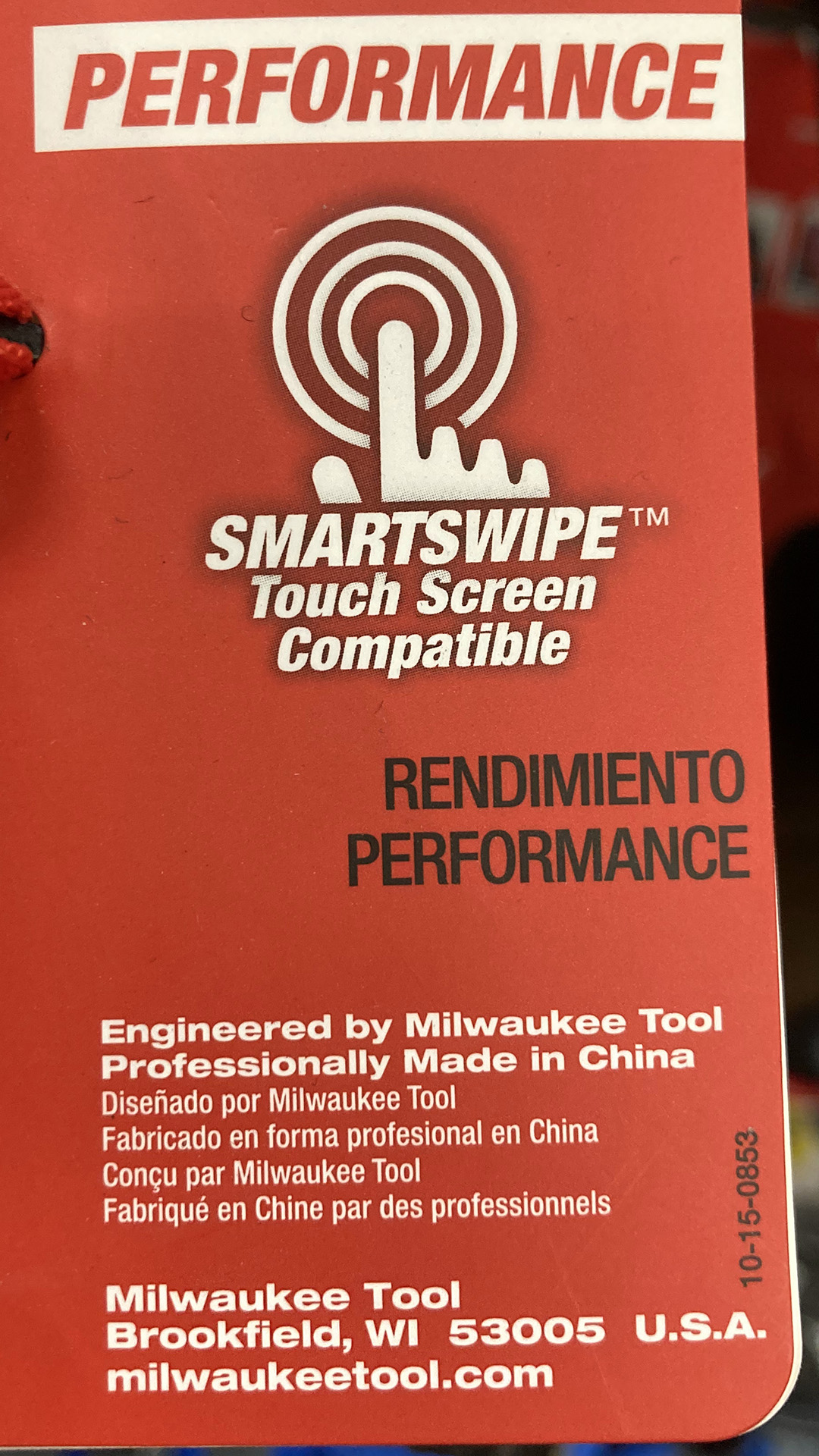
The label on a pair of Milwaukee Tool “Performance” gloves is seen at a Home Depot in Madison on Feb. 5, 2023. It reads “Professionally Made in China.” (Credit: Zhen Wang / Wisconsin Watch)
Xu said many prisoners developed eczema in hot and humid conditions at the prison workplace. Lee said he now has allergies which his doctor blames on the clouds of fabric dust he inhaled while working in prison.
Contracting down the supply chain
Lee and Xu independently identified the name of the supplier that outsourced work to Chishan Prison as Shanghai Select Safety Products, which advertises its own line of gloves.
Lee said he heard the name from the prison police and also saw it on purchase orders. Xu recalled hearing the supplier’s name from a prisoner who worked in a warehouse stocking gloves.
In August 2015, Shanghai Select Safety Products signed a $1 million contract with Techtronic Trading Limited, a subsidiary of Techtronic Industries, according to a 2018 initial public offering filed with the Chinese National Equities Exchange and Quotations. The contract was later renewed, and the Chinese manufacturer was contracted to make “Performance Gloves” for Techtronic Trading in 2017, the IPO shows.
Also in June 2015, Milwaukee Tool introduced a new product, Demolition work gloves. The next year, the company launched three more models: Free-Flex, Performance and a fingerless version of Performance made of the same polyester fabric.
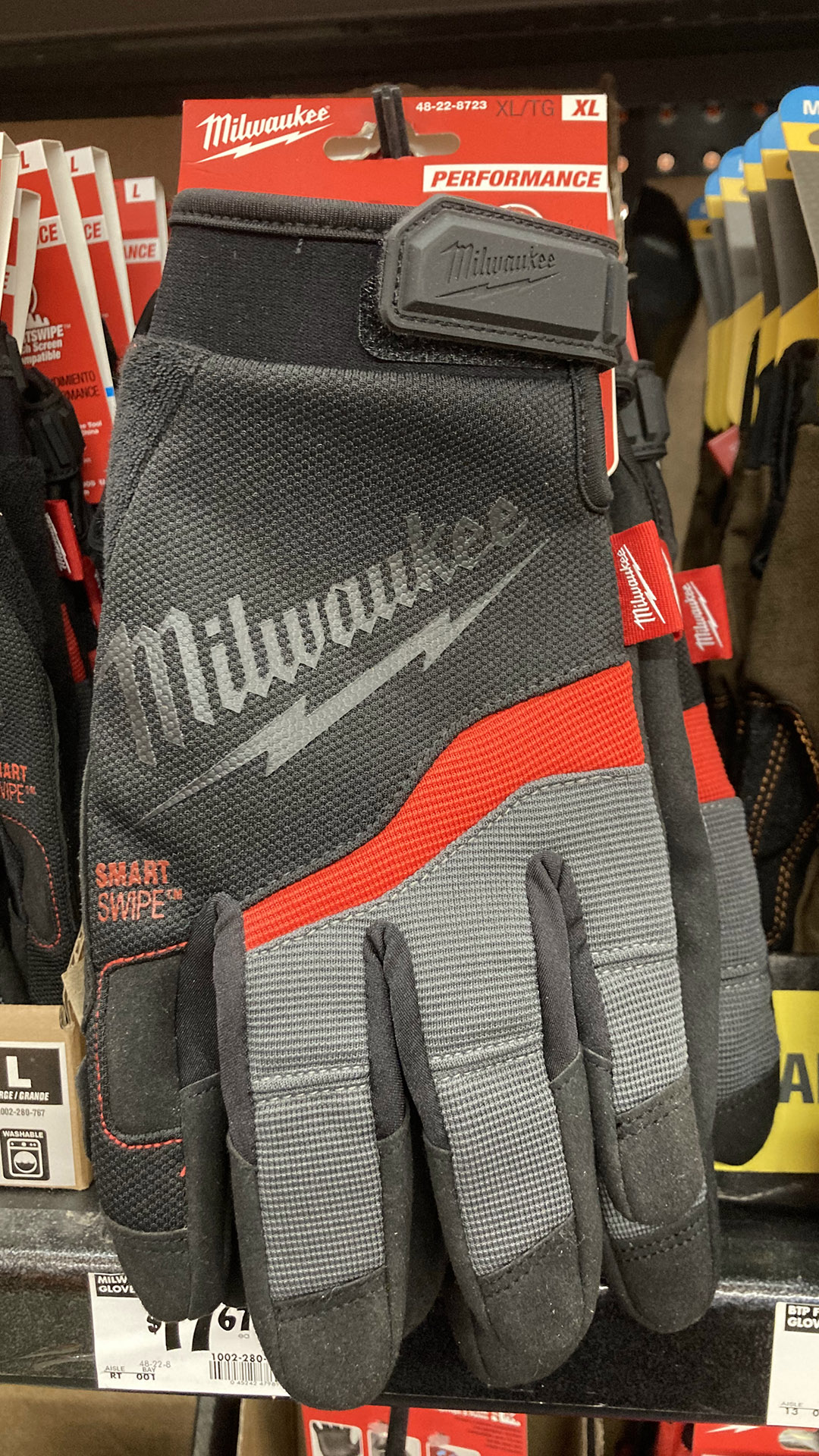
Milwaukee Tool “Performance” gloves are seen at a Home Depot in Madison on Feb. 5, 2023. (Credit: Zhen Wang / Wisconsin Watch)
“For the next two, three, and four years, you’ll continue to see me up here talking about the new latest greatest gloves from Milwaukee,” a Milwaukee Tool product manager announced at a 2016 event.
Milwaukee Tool has continued to expand its product line to add gloves with dipped coating and goatskin leather work gloves.
Salesperson: ‘We’re making the majority of Milwaukee-branded work gloves’
In February, this reporter sought to purchase Milwaukee Tool-branded gloves on Taobao, China’s version of Amazon.com. Two third-party vendors told the reporter they sell work gloves that suppliers rejected as defective. Shanghai Select Safety Products was one of such suppliers.
Posing as a middleman for an American buyer, this reporter separately contacted a self-identified Shanghai Select Safety Products salesperson. “We’re making the majority of Milwaukee-branded work gloves,” the salesperson said in a text message.
The salesperson shared a catalog that identified Shanghai Select as a gloves supplier for Milwaukee Tool.
Shi believes Shanghai Select Safety Products outsources to cut labor costs and subcontracts portions of work gloves orders to the Chishan Prison corporation.
China’s government prison enterprise system requires provincial governments to pay for prison operations. The government-run prison enterprise contracts with private businesses for prisoners to produce goods, generating revenue to run the prison.
Chishan Prison contains around 2,900 prisoners. The same prison corporation runs 11 manufacturing spaces within the compound.
- Chishan Prison houses around 2,900 prisoners in a compound that includes 11 manufacturing spaces where prisoners are forced to work. “The whole prison is mainly divided into two separate areas of manufacturing and living area for prisoners” says Lee Ming-che, who was convicted in China of “subverting state power” in 2017 and released in April 2022. (Credit: Satellite image ©2023 Maxar Technologies)
- Chishan Prison is located in Hunan province in south-central China. Lee Ming-che, who was incarcerated at the prison, told Wisconsin Watch the purple border denotes the living area for prisoners while the yellow border shows the manufacturing area of the prison. The colored borders were added by Wisconsin Watch. (Credit: Satellite image ©2023 Maxar Technologies)
Examining satellite imagery, Lee and Xu each pointed out the buildings on prison grounds where they made gloves.
These long, rectangular workshops cover more than 80,000 square meters. Their metal roofs are brightly colored, often blue, but sometimes red or black, according to the satellite image.
Forced labor a growing concern
Concerns over the use of forced labor in China are rising in the United States. A 2021 law prohibits importation of all goods from China’s far-western Xinjiang region due to the rampant use of forced labor. Chishan Prison sits outside of that region.
Since the 1990s, CBP has issued 60 active enforcement actions related to goods made by prisoner laborers, with two-thirds against Chinese goods. China in recent years has faced scrutiny related to the use of forced labor of Uyghurs, a largely Muslim ethnic minority group whom Chinese officials have forced into “re-education” camps — a move the United Nations has said could be considered a crime against humanity.
Ryerson of the Corporate Accountability Lab said the new regulations and scrutiny should prompt American companies to reassess and better monitor their supply chains.
“If you are so far removed from the supply chain that you are unknowingly sourcing from a Chinese prison, you are actually not keeping up with the rest of the industry,” she said.
Peter Rickman, president of the Milwaukee Area Service and Hospitality Workers Organization, said such exploitative conditions stem from corporate executives who chase profits at the cost of the working class. Milwaukee Tool reported $8.1 billion in sales in 2022, mostly in North America.
“Maybe (Milwaukee Tool is) ignorant of it. Maybe they are surprised themselves,” Rickman said. “But that doesn’t lessen their responsibility for ensuring wherever their production facilities are that workers are treated with dignity, respect, and humanity and are paid living wages.”
Forced laborers at Chishan Prison get reimbursed monthly depending on the complexity of the task, ranging from 20 to 300 yuan, or $3 to $43, according to Lee and Xu.
In Wisconsin, some prisoners work in state-owned correctional industries and facilities. They get paid 97 cents per hour on average, according to an ACLU analysis. That equates to a monthly wage of $155 under 40-hour work weeks.
Over the past decade, American customers have found notes in the products hidden by inmates who make Christmas cards, paper bags, ornaments or garments in Chinese prison labor facilities. Released prisoners claimed they were forced to produce goods for renowned brands.
Dragged into glove production
In the summer of 2019, Lee said he noticed many inmates pivoting away from other work to sew work gloves for Milwaukee Tool. He said the following year, he became part of the production line of hundreds of prisoners.
Lee said the 90-plus hour weeks they produced Milwaukee Tool gloves violate China’s laws and regulations, including Chinese Ministry of Justice guidance to limit prison labor to 40 hours per week. The guidance also states prison labor products should be sold only within China.
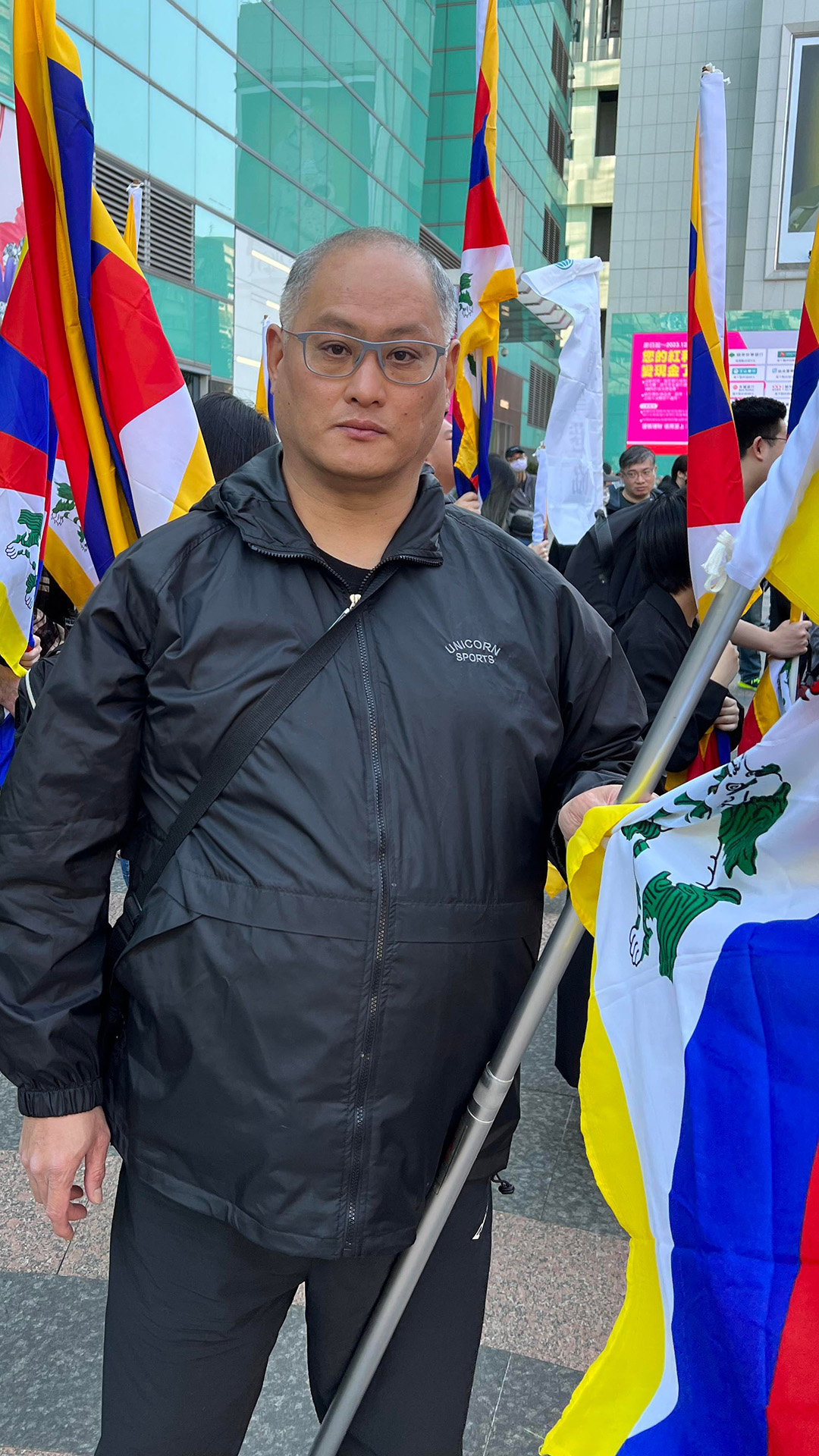
Lee Ming-che participates in a protest. A Taiwanese college administrator, Lee was convicted in China of “subverting state power” in 2017 and released in 2022. He says he was forced to make Milwaukee Tool glove models under grueling conditions while incarcerated at Chishan Prison in China’s central Hunan Province. (Credit :Courtesy of Lee Ming-che)
But Chinese law prohibits work refusal by incarcerated people who have the ability to work. Prisoners can be sent to solitary confinement for refusing work, not working hard enough or “intentionally destroying tools of production.”
“Everything we know about the prison system in China indicates that prisoners do not have any meaningful choice in terms of engaging in labor,” said Nicholas Bequelin, former Asian-Pacific Regional Director at Amnesty International and a visiting fellow at Yale Law School.
“There just is no evidence that prisoners can refuse to work. And so, to that extent, that would be considered slavery.”
Mixed results of self-regulatory tools
Techtronic Industries Company Limited, Milwaukee Tool’s parent, says it uses compliance tools and third-party auditors to ensure its 2,825 direct suppliers, including 1,165 in Asia, comply with its policy against modern slavery and forced labor.
“The supplier relationship will be terminated if major compliance issues are not corrected to meet set standards,” the company said in a 2022 Environmental, Social, and Governance report.

The Milwaukee Tool global headquarters are seen at 13135 West Lisbon Road in Brookfield on March 9, 2023. Regulatory filings show Shanghai Select Safety Products was contracted to manufacture “Performance” gloves for a subsidiary of Milwaukee Tool’s parent company. Two former Chishan prisoners separately identified Shanghai Select Safety Products as a Milwaukee Tool supplier that outsourced work to their prison, where they were forced to produce gloves for the equivalent of pennies each day. (Credit: Jim Malewitz / Wisconsin Watch)
But self-regulatory tools used by many multinational companies are flawed and often unable to detect forced labor, research shows.
For a 2021 book, Professor Sarosh Kuruvilla, a labor policies expert at Cornell University, examined more than 40,000 factory audits from 2011 to 2017 spanning 14 industries and 12 countries, including China. He found 45% were based on unreliable or falsified information. Audits in China were unreliable more than half the time.
Li Qiang, the founder of the New York-based nongovernmental organization China Labor Watch, said suppliers falsify information in multiple ways, such as faking data related to workers, products and salaries.
A 2018 study co-published by the University of Sheffield found audit systems tend to focus on the workforce of first-tier suppliers and neglect subcontracted portions, where the risks of forced labor are “highest.”
The study argued big brands squeeze suppliers by imposing short-term contracts, penalties and fees for late or low-quality orders while demanding razor-thin margins from the bottom of the supply chain.
Pressure to balance their own books and fear of jeopardizing contracts pushes suppliers to deceive auditors.
Li said subcontracting is common in China — especially for suppliers who cheaply fulfill orders from American buyers. Under these circumstances, the suppliers outsource part of the order without necessarily recording it, he said.
“When a supplier is placed to produce 10,000 pairs of gloves but subcontracts half, it is too hidden for auditors to find it out during the on-site audits,” Li added.
Suffering ‘survivor guilt’
Back in Taiwan, Lee continues to speak out about his years in Chishan Prison. He calls forced labor a menace to human rights and global free trade.
“I certainly feel that I have the obligation to prove the thing happened there,” Lee said.
Shi said she suffers from “survivor guilt” as she lives relatively comfortably in the United States while pushing to improve conditions for her husband in China.

Shi Minglei, the wife of an imprisoned Chinese human rights activist Cheng Yuan, lives in Minnesota and continues to try to improve conditions for her husband. (Credit: Ariana Lindquist for Wisconsin Watch)
After Chinese officials arrested Cheng in July 2019 on subversion charges, Shi and her 3-year-old daughter were placed under house arrest for 180 days on suspicion of financing his activities. Shi said five Chinese security police officers interrogated her after she posted the family’s struggles on Twitter — threatening to take her daughter away if she continued posting.
That prompted Shi to flee to the Twin Cities, where she plans to keep pressing Milwaukee Tool to stop benefitting from forced labor. In fact, Shi and her attorneys are gearing up for a lawsuit against the company for the use of forced labor.
“We hope Milwaukee Tool will acknowledge it, apologize for it, and stop it,” Shi said. “We won’t surrender.”
Editor’s note: In Chinese culture, people typically list their family name first, followed by their given name. On second-references to Chinese people quoted in this story, Wisconsin Watch is using their family name.
The nonprofit Wisconsin Watch collaborates with WPR, PBS Wisconsin, other news media and the University of Wisconsin-Madison School of Journalism and Mass Communication. All works created, published, posted or disseminated by Wisconsin Watch do not necessarily reflect the views or opinions of UW-Madison or any of its affiliates.
 Passport
Passport




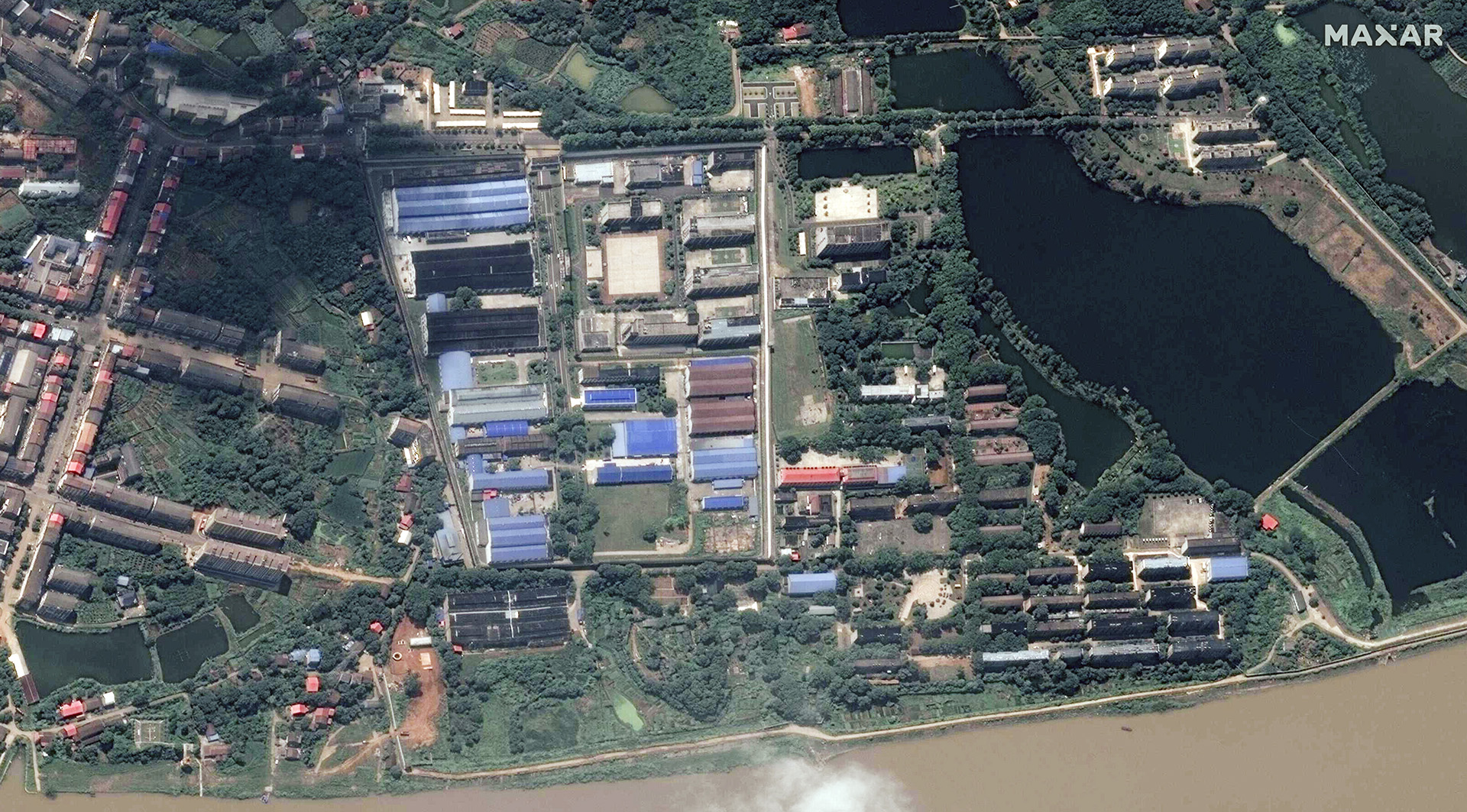
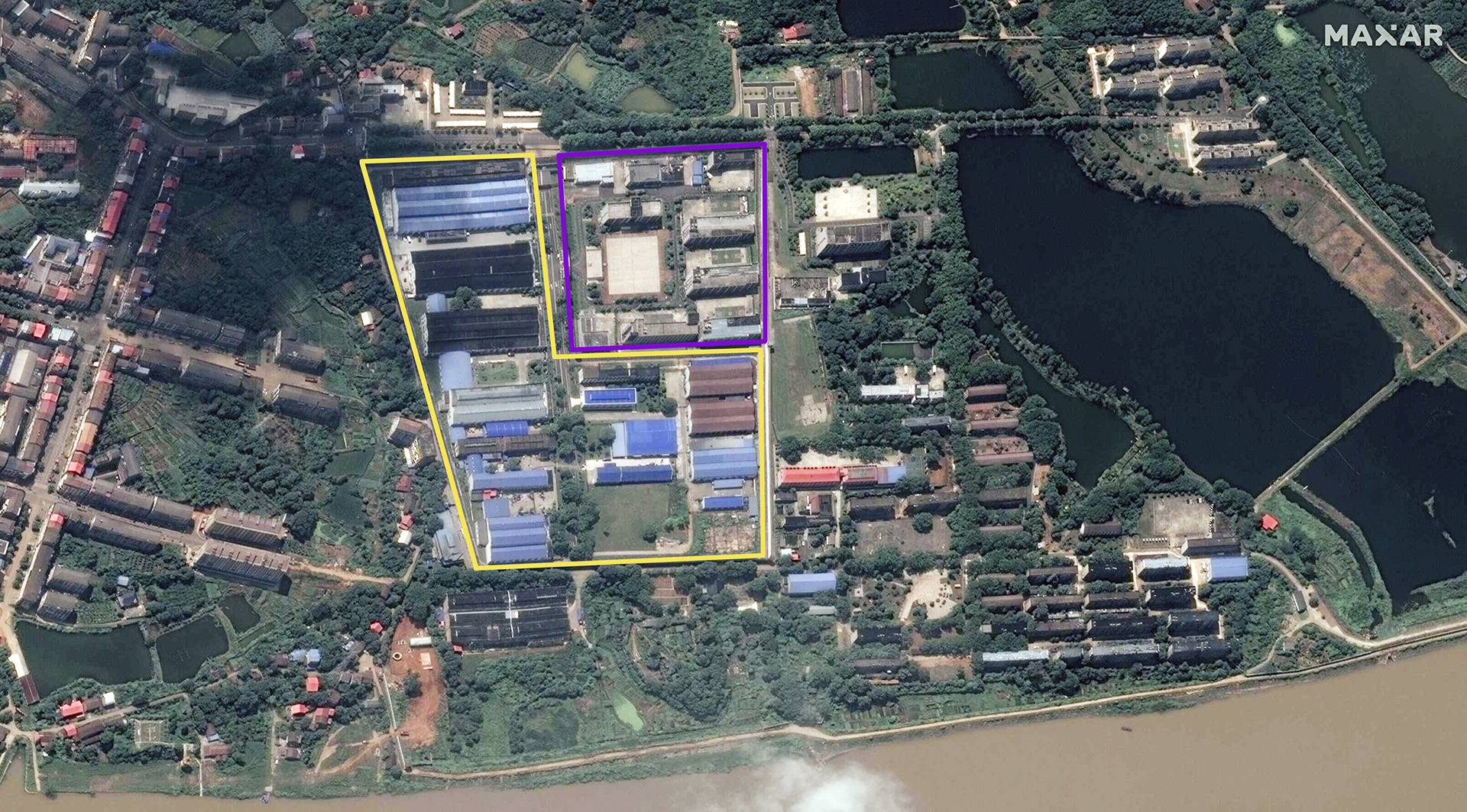
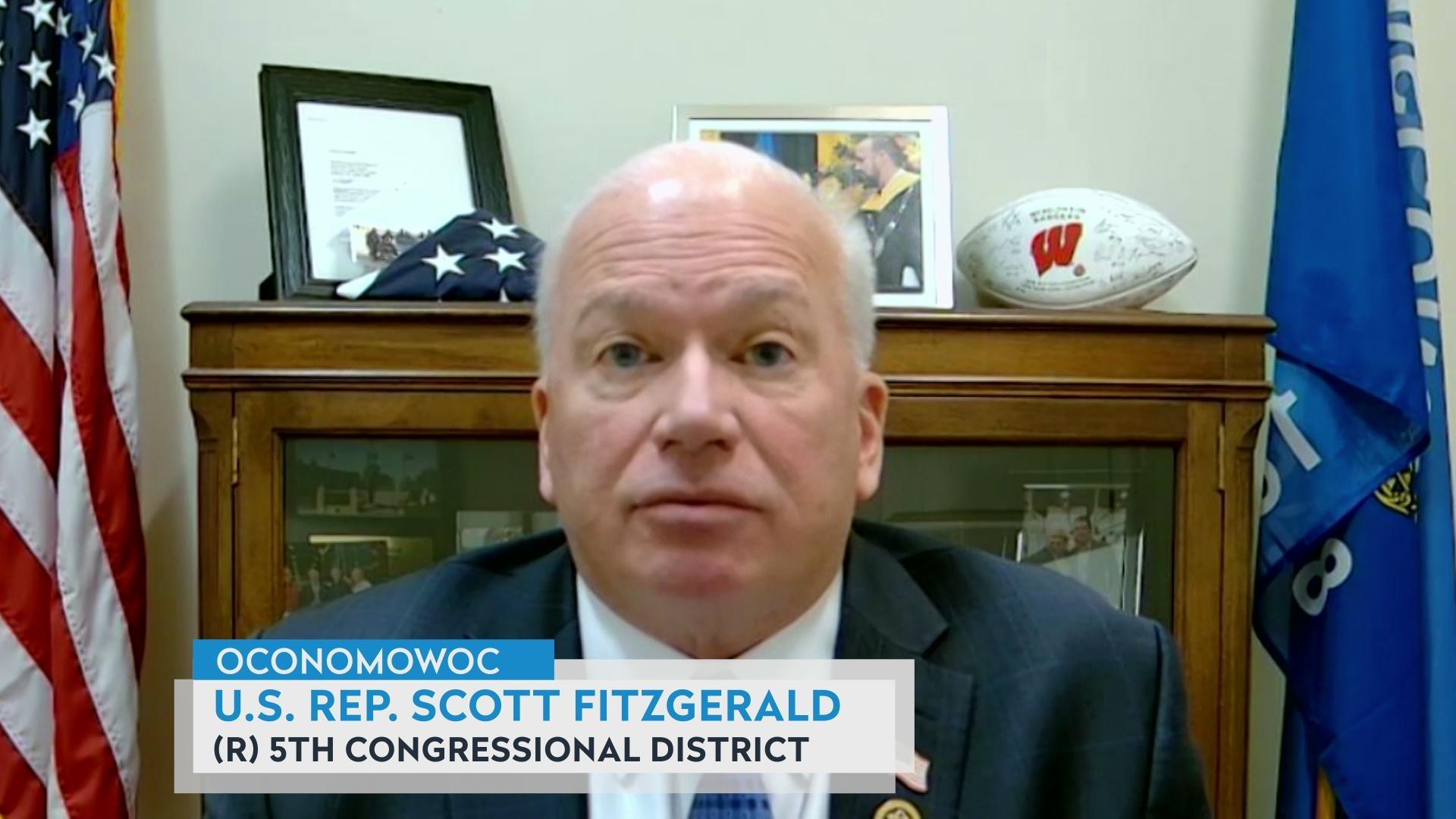
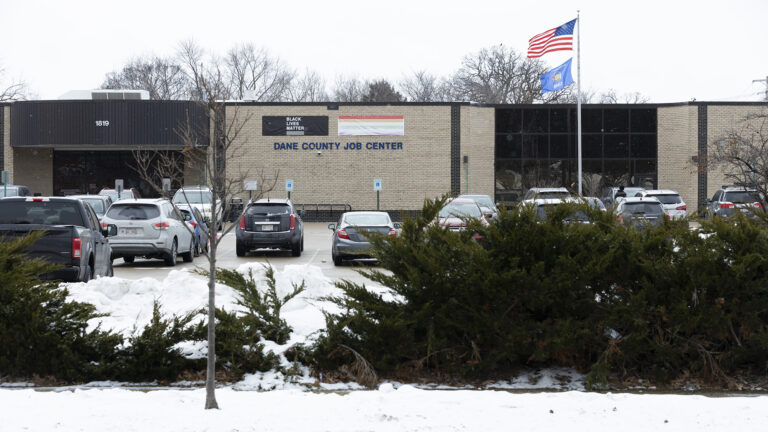

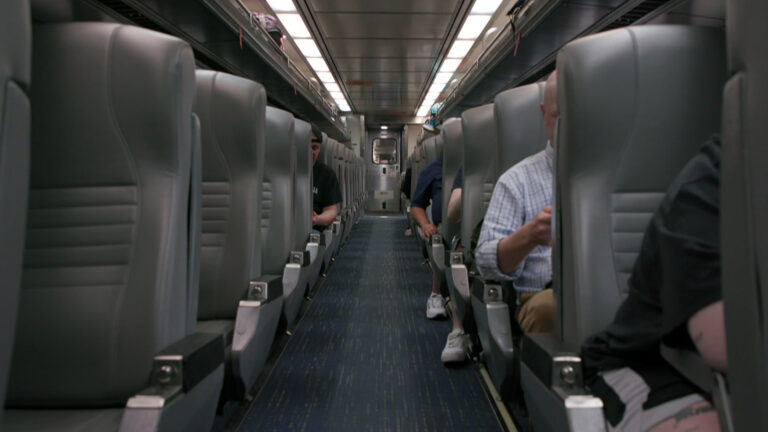



Follow Us